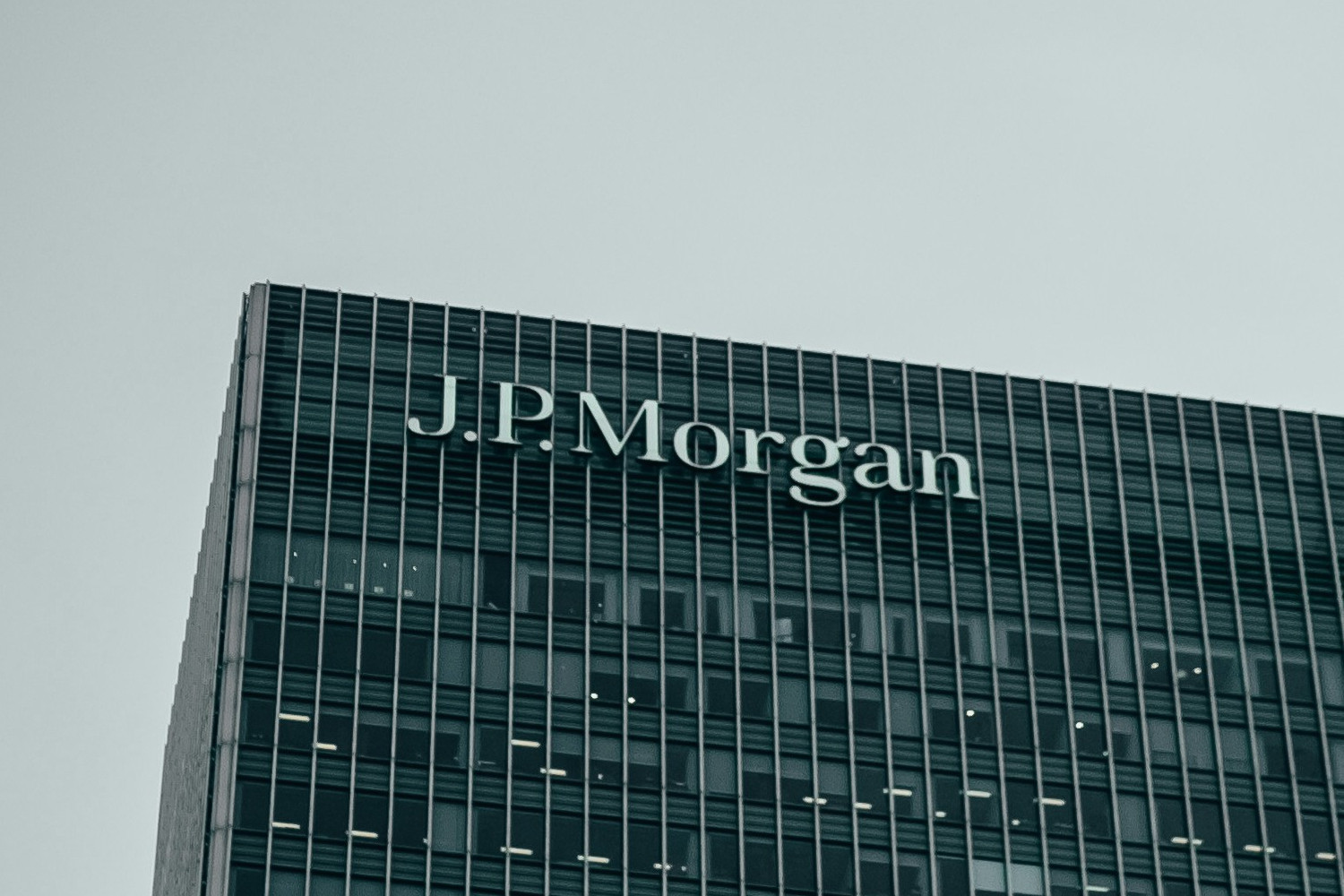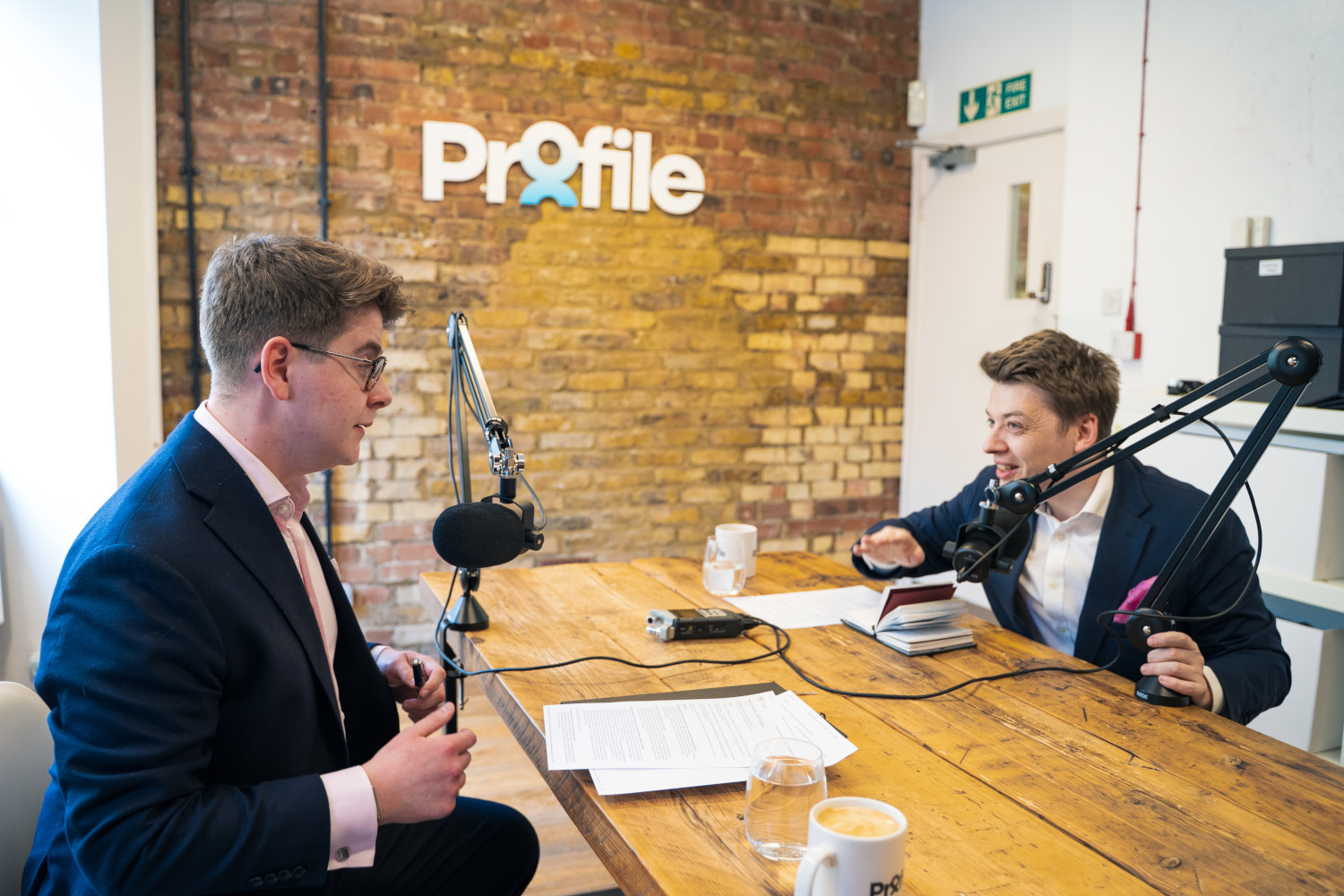Podcast
C-Suite Signals: Jamie Dimon, JPMorgan Chase.
In this episode, Profile CEO Jordan Greenaway and Client Manager Isaac Goldring break down the profile of Jamie Dimon, Chairman and CEO of JPMorgan Chase.

[NEW INSIGHT] Why multimedia is becoming a CEOs most powerful thought leadership tool in 2026
In this episode of C-Suite Signals, Jordan and Isaac discuss Jamie Dimon's career to date, his knack for media engagement, how his visible leadership sets a positive precedent for others, and what they believe could elevate his profile.
Each episode dives into the career paths, management styles, and current activities of today’s top business leaders, giving listeners a front-row seat to leadership in action.
Jamie Dimon is the Chairman and CEO of JPMorgan Chase. He has led the company since July 2006, having previously acted as CEO for Bank One, which merged with JPMorgan in 2004.
Under his leadership, JP Morgan Chase has become the leading U.S. bank in domestic assets under management, market capitalisation value, and publicly traded stock value.
In 2009, Dimon was considered one of "The TopGun CEOs" by Brendan Wood International, an advisory agency.
Today, he remains a prominent voice in global finance, frequently weighing in on economic policy, regulatory reform, and geopolitical risks.
Jordan (J): Welcome to C-Suite Signals, the podcast where we break down how today's top CEOs are showing up in public. I'm Jordan Greenaway, CEO at Profile, and on each episode, I'm joined by a colleague from the Profile team to unpack the leadership signals that matter.
In 10 minutes or less, we assess one high-profile CEO's public profile and ask: Are they building trust, showing leadership, and cutting through the noise?
So let's get into it.

Jordan (J): Today. I'm joined by my colleague, Isaac Goldring, the client manager in our finance team, to discuss and break down the profile of Jamie Dimon, CEO of JPMorgan Chase.
Isaac, thank you for joining me.
Isaac (I): Thank you for having me, Jordan. Very much looking forward to it.
J: So, Isaac, let's lay out some context for people who are listening. Obviously, Jamie Dimon is well known to us in terms of the finance unit, because he's a very high-profile figure in finance.
But, tell us a little bit about him, and what's the headline? Why has he grabbed your attention for this episode? What's he been doing recently?
I: Well, Jamie Dimon, as many people will know, is the head honcho of JPMorgan Chase. And I know you said, why is he capturing the headlines?
Actually, I don't think this is a one-case situation, Jordan.
Jamie, and I'll use Jamie as if I'm his friend here, is near ubiquitous across the press. And actually, it's now near expected that we'll hear his take whenever a global macroeconomic shift, administration change, or monumental policy release breaks.
You know the words, whenever you're looking through the media, flicking through the pages, the words, JP Morgan, CEO, Jamie Dimon, will land on headlines across the globe.
J: That's why, I suppose, this podcast is a little bit different from usual, because usually we pick up a single story. But you're right, Jamie Dimon and JP Morgan in general, are in the papers day in, day out.
But try to answer this question as well as you can in that context, which is, if you look at the spread of media coverage, if you look at where he's featured in the news more recently and beyond, do you think he comes across as authentic, or do you think his approach to PR is more kind of strategic or tactical, you could say?
I: I read, as I usually do. I was flicking through the papers this morning. And I read a New York Times subheading that characterized Jamie as being known for his frankness. And I think that's true!
Jamie is nothing but authentic. And while he might understandably hold back the punchiness of his takes, being of such influence, of course, that is necessary — you don't want to deter other important stakeholders in the business — he's more than happy to put his head above the parapet and make his views clear.
Of course. You know, I won't cast any dispersions. There is an element of strategy here.
Being of such size and influence. Being of one of the US's, if not the world's, largest banks, Jamie has the ability to move markets. That is clear.
J: I think that's interesting.
I kind of thought about this in advance as well. I didn't read the whole 60 pages of the letter to the shareholders, but I went through the headings, and I read a couple of pages that were particularly interesting. And what stood out to me, Isaac, is he was quite outspoken in the letter.
He was talking about how the US is being held back by the quality of education. He was talking about investment in infrastructure. He was talking about tariffs and the tariff policy. He was even talking about immigration in the letter. Something that actually goes beyond what you would generally expect a conventional CEO to talk about.
So, I definitely think that he was outspoken on these top-of-mind topics.
I couldn't shake the feeling, though, when I read the letter, that although it had an authentic voice, and although it was outspoken, every single word, heading, and paragraph felt strategic.
Why do I say that? Because, in some senses, it could have been written by a member of Trump's administration. I mean, he ticked every box that would satisfy and positively engage the new administration.
So, even though I thought it was outspoken, and actually he was putting his head above the parapet, I couldn't help but think it was strategically informed all the way through, which kind of brings me to the next question, which is, if you look at his profile and media coverage, how do you think it's landing with key stakeholders?
I've kind of talked about the administration there, but I mean broader than that. I mean customers, employees, investors, and I suppose the media more generally.
I: Well, to be honest, Jordan, I think the media is relatively easy here.
You know, I know, when you're dealing with the media, it might sound cliche and nondescript, but it's key you have a story and one that you know has enough bite to attract, generate, and, I don't know, secure coverage.
That said, any journalist will tell you that there are exceptions to that, and that global figures like Elon Musk and Jamie Dimon are just key takers. They will take a quote, no matter what it is, and that's not made up.
I've gone out for plenty of coffees and lunch with journalists that have said that exact quote to me in person. It's either Elon Musk or Jamie Dimon. That's one interview takes all.
Also, besides that, besides his influence, size, and credibility there. I also just think Jamie is a very open, honest, and candid guy. The media likes open books. I think that's end of. And that's part of his appeal, Jordan.
J: Interesting, Isaac. And obviously, people listening to this, they'll think, you know, Jamie Dimon is such a big figure that, regardless of what he says, he'll get coverage. So, is it almost kind of, is it that practical or helpful for us to talk about his profile?
I think it is.
I think it is because there are organisations of the same size and same influence who don't have such outspoken, visible CEOs.
Absolutely, Jamie Dimon could have made the decision 20 years ago, or whenever he started, not to say anything at all. So, that kind of begs the question, as a CEO in his position, what's the risk of saying nothing at all, and more than that, do you think that he struck that balance right, Isaac?
I: Banking is, by nature, a highly regulated industry.
However, I think Jamie has built a reputation where, if he said nothing, people would be more worried than if he went out there and was super frank, super honest, and super candid with reporters and the public.
I think that's actually key to his reputation, and key, by way of that, to JP Morgan's brand.
J: I think there's a really good point, actually, Isaac. And you know, sitting in our office in London, I don't want to get carried away with ourselves and any advice that we could give Jamie Dimon.
You know, he's got a very strong, well-regarded, large, experienced comms team, and I know they would have thought about everything from pretty much every single angle.
But if you were sitting in his office alongside him, Isaac, what bit of advice would you give him for the future?
I: Sure.
We know Jamie is proficient in media engagement and media relations. He's a highly skilled media operator. He's got years of experience under his belt in dealing with the press.
However, one look at his LinkedIn, and you might be tempted to say more social media.
He's a regular guy. He's extremely active, and he makes his views known all the time. More active updates, and building more regularity into his social media schedule, I think, would add quite a nice cadence and real-time aspect to his views.
I also think on a practical and more reputational perspective, it could take the edge off some of the more bombshell views he might drop live on air or in an exclusive article, and has the potential to soften some of the impacts of his punchier takes.
I don't think we could ignore the use of social media for that aspect.
J: Thank you very much, Isaac.
And that is about it for this episode of C-Suite Signals, where leadership meets visibility.
And if you're a CEO, of course, ready to lead from the front, or you're interested in getting some advice for your wider leadership team, please get in contact with us at Profile.
But until next time, stay visible!